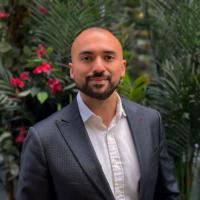Last month, the 2025 Procurement, Supply Chain and Sustainability LIVE conference brought together industry leaders, procurement professionals and sustainability changemakers.
With just five years remaining of the 2030 agenda for sustainable development, the mood was pragmatic, urgent and refreshingly honest. Below, we’ve captured some of the most compelling takeaways from this year’s event.
1. Regulation Isn’t Enough; It’s Time to Reframe the Business Case
One of the strongest themes echoed throughout the conference was the growing anxiety around the potential rollback of environmental regulation, particularly amid increasing geopolitical and economic uncertainty. While policy tools like the Carbon Border Adjustment Mechanism (CBAM) are gaining traction, compliance alone is no longer seen as a sufficient lever for change.
As Gerard Gallagher put it:
"Sustainability needs to find new pools of value. It needs to learn and speak the language of business and growth."
Organisations have become highly effective at reporting risk, but far less so at funding and implementing sustainable action. With the low-hanging fruit already picked, the focus now shifts to deeper transformation, commercial alignment, and cross-functional execution.
To successfully reframe the business case for regulation, organisations now need commercially savvy sustainability leaders who can translate ESG goals into business performance.
The next wave of sustainability hiring will favour hybrid professionals who are able to combine environmental knowledge with operational, legal and financial expertise. To attract and retain top talent, boards and hiring teams will also need to rethink role definitions, KPIs and long-term career development pathways within sustainability functions.
2. Scope 3 Remains the Elephant in the Room
Sessions around Scope 3 emissions were among the most animated. Despite its importance, Scope 3 remains a complex, often misunderstood area – particularly in sectors with low maturity or poor supplier engagement.
Speakers raised concerns around:
- Data inconsistencies
- Long reporting lags
- A lack of standardised methodologies
Insetting is emerging as a promising route for driving pragmatic change within value chains, but current SBTi guidance still excludes it from formal reporting structures.
"Five years to 2030 means 20 quarters or 60 months to deliver meaningful impact. The clock is ticking."
Organisations are increasingly looking for sustainability professionals who can effectively engage with complex supply chains, especially in industries with lower data maturity. Skills such as supplier engagement, stakeholder alignment and the ability to interpret incomplete or inconsistent data are becoming essential. There is also growing demand for individuals who can navigate uncertainty and transform vague emissions data into credible strategies and actionable plans.
3. Technology Can Help, but It’s Not a Silver Bullet
The promise of technology in sustainability reporting and compliance was another hot topic. However, several speakers issued a word of caution: tools are only as effective as the data they rely on.
Real operational data – not “golden demos” – must be at the heart of decision-making. There were interesting discussions around AI-powered bots for compliance automation, SaaS carbon data platforms and blockchain solutions for Scope 3 transparency. But these tools must be deployed with a clear understanding of data governance, GDPR, and practical integration challenges.
The growing presence of new technologies in the sustainability space is creating more demand for tech-savvy sustainability roles. Data analysts, AI specialists and software developers with a strong understanding of ESG principles are becoming core to delivering results.
Cross-functional talent that can bridge sustainability objectives with IT infrastructure and digital transformation strategies is also especially valuable, as organisations look to scale and integrate their data solutions.
4. From Compliance to Capital: Reframing the Sustainability Dialogue
"Sustainability—meet your new colleague: capitalism."
As the sustainability agenda matures, it must increasingly coexist with the financial imperatives of business growth. Several speakers urged sustainability professionals to evolve their approach – moving from compliance mindsets to value creation narratives that resonate with CFOs and boards.
There’s now a need to define a commercial strategy, accelerate operational transformation, and enable capital transitions through well-evidenced roadmaps.
To do this, CSOs and sustainability teams must:
- Define a clear strategy, assess operating models and business risk and build a credible case for change.
- Accelerate action through roadmap development, supply chain transformation and investment in technology.
- Enable transition by unlocking capital, developing future skills and ensuring robust stakeholder communication.
Sustainability professionals are now expected to build and articulate strong business cases that align with executive priorities. Financial literacy is quickly becoming essential for senior sustainability roles, particularly those operating at the boardroom level. As a result, hiring is shifting toward transformation-focused roles that emphasise impact modelling, scenario planning and value creation over compliance alone.
5. The Role of the CSO is Evolving, But Many Are Struggling
One of the more sobering statistics shared came from EY, which found that 60% of CSOs feel isolated, frustrated and lacking the internal influence or resources to effect real change.
Many boards are still not fully educated on the complexity and opportunity embedded within the sustainability agenda. And while CSOs have excelled at regulatory reporting, there’s a growing need for them to drive transformation, not just compliance.
Hyper-collaboration across the C-suite will be key:
- CFOs bring capital access
- CIOs manage data infrastructure
- Legal and procurement teams shape contractual frameworks
- Boards must be upskilled to navigate policy volatility
Organisations need to clearly define the scope, authority and resourcing of CSO roles if they want to retain and empower their sustainability leaders. Leadership development, mentorship programmes and access to peer networks are becoming increasingly important to support these roles.
Talent strategies should also focus on upskilling existing teams in procurement, legal, and operations to embed sustainability more broadly across the organisation.
6. Less Reporting, More Doing
Sustainability reporting came under the spotlight, particularly the tension between frequency and impact. While some organisations are drowning in monthly or quarterly reports, others are opting for fewer, higher-quality insights that actively inform decision-making.
Speakers stressed the importance of aligning Scope 1, 2 and 3 reporting so that sustainability data flows effectively across the entire value chain. And, with many still struggling to turn disclosure into action, the call for a more pragmatic, outcome-focused approach was loud and clear.
"Perfection is getting in the way of progress. Focus on what’s directionally right."
Skills in sustainability communication, internal influence and stakeholder management are now more important than ever. Organisations also need professionals who can facilitate cultural change, e.g. those who can guide teams away from a compliance mindset and towards a more pragmatic, action-oriented approach.
Final Thoughts: A Time for Pragmatism, Not Paralysis
There was a strong consensus that we’re heading into an unpredictable and turbulent period – but turbulence is not the same as inaction.
As one speaker put it:
"Turbulence just makes the ride bumpy. It doesn’t mean we’re not still moving forward."
In the years ahead, organisations will need to double down on innovation, collaboration and delivery. The organisations that win will be those who reframe sustainability not as an obligation, but as a source of strategic, operational and human value.
What it means for future talent:
Sustainability is no longer a side-of-desk topic – it is core to business strategy. Hiring approaches need to evolve accordingly. From data scientists and supply chain analysts to commercially minded CSOs and sustainability storytellers, organisations must build capability across every level of the business. Those that integrate sustainability into leadership development, succession planning and long-term talent strategy will be best placed to lead the transition.
Proco Group partners with organisations across the global consumer, industrial and commodity markets to map the talent landscape and hire high-performing professionals into critical roles. For a conversation about your hiring strategy for 2025 and beyond, please don’t hesitate to get in touch.
Partner | Industrial Markets | EMEA
P: +447990 306595 E: adam.harman@weareprocogroup.com
Partner | Consumer Markets | EMEA
P: +44 E: zarah.morton@weareprocogroup.com




